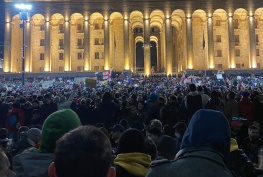In U.S., Pakistanis Eye Election Back Home
By Khalid Khattak
Published in The Wall Street Journal on May 10, 2013
WASHINGTON—As Pakistan votes Saturday, few are watching with the apprehension felt by hundreds of thousands of Pakistanis in America.
For them, fraught relations between their native and chosen lands are as worrisome as the threats posed by political violence back home.
Next to Britain, the U.S. has the largest number of Pakistani residents outside of the Middle East, part of a world-wide diaspora that represents the second-largest contributor to Pakistan’s economy through the remittances they send back.
As Pakistan attempts what would be its first-ever transition from one civilian government to another, these Pakistanis are watching closely. “There will be problems. But I expect good turnout because people need change,” said Akbar Chaudhry of Alexandria, Va., who has spent over 30 years in the U.S.
U.S. officials have condemned pre-election violence and planned to send observers, State Department spokesman Patrick Ventrell said.
The Pakistani Embassy in Washington estimated there are 800,000 to 900,000 Pakistani nationals, Americans of Pakistani descent and dual nationals—those holding both Pakistani and American citizenship—across the U.s., with the heaviest concentration in New York, New Jersey and adjoining areas.
Many won’t be voting. Last year, the Election Commission of Pakistan announced it would allow overseas Pakistanis to vote in the elections. But no mechanism has been put in place to allow it.
Many Pakistanis jammed flights back home in order to cast their ballots. Others who couldn’t make the trip were disappointed.
Mr. Chaudhry, a supporter of Pakistani sports-star-turned-politician Imran Khan and his PTI party, attributed the absence of voting rights to Mr. Khan’s challenge of the country’s existing political establishment.
“Everyone knows which party overseas Pakistanis like the most,” Mr. Chaudhry said.
Pakistanis in America at the same time are hopeful that the Saturday’s elections will bring a government that will solve the crises the country has been facing over the years.
The biggest challenges at home are corruption and an energy crisis that has crippled the country.
“The outgoing government did extremely poor on these vital fronts,” said Dr. Naeem Chaudhry, a pediatrician in Duluth, Minn., who is no relation to Akbar Chaudhry, adding that Pakistan should maintain good relations with the U.S., based on mutual respect.
Voters are concerned over terrorism and U.S. drone strikes, which many Pakistanis find tantamount to violation of their country’s sovereignty. Any new government will need to address U.S. ties in the wake of roller-coaster relations between the two countries in recent years ahead of ahead of 2014 U.S. withdrawal from Afghanistan, which depends on the use of land routes through Pakistan.




